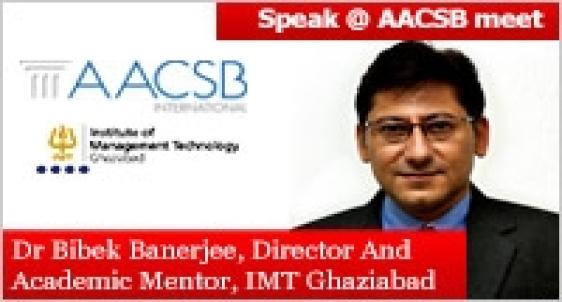
In recognition of growing importance of Indian management education on the global stage, the AACSB International invited Dr Bibek Banerjee, Director and Academic Mentor, IMT Ghaziabad, to present ‘The context of management education in India’ at its Annual Asia-Pacific Conference 2014, held in Kuala Lumpur on 22 October 2014.
In his succinct and well received address, Dr Bibek Banerjee outlined India’s unique challenges and opportunities in management education. He emphasized that while India offers many unique opportunities for global management education players, its complexity, often characterized by paradoxes, require incisive insight and minute attention to executional details for success.
The Demographic Dividend
Dr. Banerjee recounted the Indian Prime Minister’s tagline on the Indian opportunity - Demography, Demand and Democracy. These 3Ds are the three key pillars of strength for India, which differentiate this market from any other, he said. Elaborating the ‘on the potential demographic dividend’, Dr Bibek Banerjee emphasized that by the year 2030 the population of 18-23 years old Indians will be approximately 140 millions, which is equal to the size of five Australias! Quoting the data on Indian demography, Dr Bibek Banerjee said, "Today, the Median age of India is 25.7 years which is 10 years less than USA and China. The median age of China is 35.2 and USA is 37 years. Clearly India is young, and the potential of youth can be utilized to generate the number of opportunities." By 2020 India is set to become the world’s youngest country with 64 per cent of its population in the working age group.
'The Dichotomous Paradox'
Dr. Banerjee informed the august gathering of Deans and Heads of B-Schools drawn from across Asia Pacific, the various seeming paradoxes that exists within the context of the Management Education in India. While there is a massive demand for seats in Top institutions, but the bottom end institutions are failing, and closing down. This is attributable to a precipitous decline in quality of education in the lesser schools, which the ‘very well informed’ aspirants are well aware of.
Dr Banerjee said that while, every year (of late), about 250,000 aspirants for Management programs appears in entrance exams like CAT, XAT, GMAT, etc but only some thousands of aspirants manage to crack the Top 20 programs due to excessive competition and scarcity of the Quality Institutes. Many who can't make it to these top tier institutions either decide to join or continue in the work force and try again, and those who can, move abroad.
The other dichotomy is with regards to the huge demand of skilled and trained workforce at every level, yet a significant number of MBA graduates going unemployed, Dr Banerjee said. This is again attributable to the discontinuous drop in quality of education.
Advantage India: Opportunities ahead
Making a strong case for investing in research oriented Doctoral education and collaboration in India, Dr Bibek Banerjee highlighted the unique opportunities available in India. Due to rising cost of western management education, India and Asia is the epicenter of demand for Management education. Also, the region is gaining more confidence and self-determination in its own educational value system. He articulated that the neo-classical westernized theories based on the homo-economicus assumptions about human motives, have often led to disastrous prediction in the past. There seems to be a big opportunity in India for the academic community to engage in alternative paradigms and discover 'alternative theories'. "India, with its sophisticated and complex economic systems nuanced with its psychosocial and cultural moorings, can be researchers’ paradise. Similarly other emerging regions in Asia Pacific have the potential to lead the world in the terms of new management thought – for which the axis of productive research needs to be re-aligned to the contexts in which we operate. Likewise, Asian and Indian B-schools have a big opportunity to make an impact on global management education by developing their own curriculum and pedagogies," said Dr Banerjee.
Challenges exist
However, despite the apparent low-hanging-fruits, tapping the Indian market is not a cakewalk. Many challenges exist, noted Dr Bibek Banerjee. For instance, Indian consumers love brands, but are also price sensitive. So education providers have to think about the right price-value equation, along with the right ingredients to building educational brands. He reminded the audience that education brands take a long time to gestate – so a far sighted and long term orientation is essential in building strong institutions.
Further, unlike many more mature markets, Indian students are highly placement focused. Unless new programs have strong placements as outcomes to the engagement process, they are unlikely to succeed. Dr Banerjee also highlighted the importance of qualified faculty in institution building. He reiterated that a mix of strong research focussed faculty along with those with deep practise orientation is critical to successes of B-schools.
Towards the end of his talk, Dr Banerjee said that IMT Ghaziabad has done well owing to its philosophy of 'Global Breadth, India Depth’. It's unique curriculum offers the participants courses which are broad in scope, but at the same time include courses that focus on India’s unique context. IMT provides its students and its faculty opportunities to continuously engage with both the academia as well as with the industry, and in the process continuously improve and innovate in its curricula, by incorporating current and emerging challenges and opportunities in the business environment. Today, IMT Ghaziabad has emerged as the best institution for strong research oriented faculty to work and develop.
Stay tuned to MBAUniverse.com for more highlights from AACSB Asia Pacific Conference 2014.


























